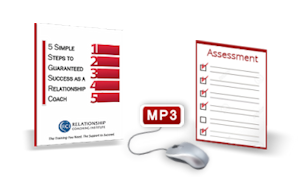 A common question of coach trainees is “As a coach can we provide our opinion or advice as long as it’s in the form of question?”
A common question of coach trainees is “As a coach can we provide our opinion or advice as long as it’s in the form of question?”
The short answer is NO.
Disguising your advice or your opinion as a question is still giving advice and providing your opinion. No, no, no.
It’s hard to get across exactly how damaging advice giving and providing opinions are to helping your client, but I’ll try:
- Doing so dis-empowers them when your job is to empower them.
- Doing so results in dependency (if they rely on your input) or push-back (when they don’t resonate with your input). Both are damaging to the coaching relationship.
- Doing so interferes with the transformation we’re trying to facilitate. Transformation comes from within the client, not by the coach telling them what they should think or do.
- Doing so is just plain arrogant and ego centered. We love giving advice, who doesn’t?
- Doing so is just plain wrong. In Science and Numbers there is such a thing as a right answer. In life and relationships the only right answer or solution is the one the client creates and chooses for themselves.
- Use your coaching skills and your Coaching Superpower to help your client be creative and discover the awareness, strategies, and choices that will help them move forward. That’s it. Nothing else. Your advice and opinion interferes with that and you are consulting, not coaching.
- People like consultants. They are willing to pay lots of money for someone who they perceive to be an expert to tell them what they should do. If you want to be a consultant, go ahead, but please don’t call it coaching and let go of caring about getting results for your client because telling them what they should do does not work.
In my view there are four primary phases of coaching:
1. Big picture Visioning of the client’s desired future
2. Goal planning to identify the steps needed to accomplish the big picture Vision
3. Action planning to strategize how to accomplish each goal
4. Implementation and follow up to execute the actions and accomplish the goals
So where would giving advice be useful?
Visioning? No, that should come from within the client.
Goal planning? No, it’s easy enough to help the client identify the steps needed to accomplish their Vision. Helping them to do so empowers them, telling them what they should do dis-empowers them.
Action planning? No, there are many ways to accomplish anything and there is no single right and best way. How to do something is easy to figure out or easy to research and find options and strategies for doing so. It is arrogant for a coach (or any helping professional) to believe that their way is the best way and impose that on the client, which dis-empowers them.
Implementation? No, this is where the coach or any helping professional is most helpless as it is up to the client to follow through on their action plan and we can’t do it for them or follow them around to make sure they do it. This is why empowerment is so important- an empowered client is more likely to take responsibility for their outcomes and take action, and a dis-empowered client is more likely to be passive, distracted, procrastinate and find excuses to not follow through.
The ONLY time in coaching that I can identify that it is OK to share your suggestion or idea is in the context of brainstorming to generate creative ideas and strategies. Brainstorming means you are BOTH throwing out ideas without attachment, the coach should elicit ideas from the client and not dominate the brainstorm, and what’s more important than any one idea (including yours) is to help the client be creative and identify options they aren’t aware of.
Brainstorming is most effectively followed up by the client doing Polling and Research after the session to identify more options and test the ones that have been identified.
Polling: Share your goal with others and ask for their input and ideas. Everybody usually has an opinion of what you should do, informed and uninformed, but this is a good reality check and it’s always helpful to learn what others have done that worked for them (i.e. “informed” opinions).
Research: The collective wisdom and knowledge of everything in the world is available in the palm of your hand or the click of a button.
Both Polling and Research will generate more ideas and strategies than is possible to brainstorm on your own, and more importantly, stimulates creativity that might result in a unique strategy perfect for your client’s situation that you wouldn’t have thought of in a million years.

